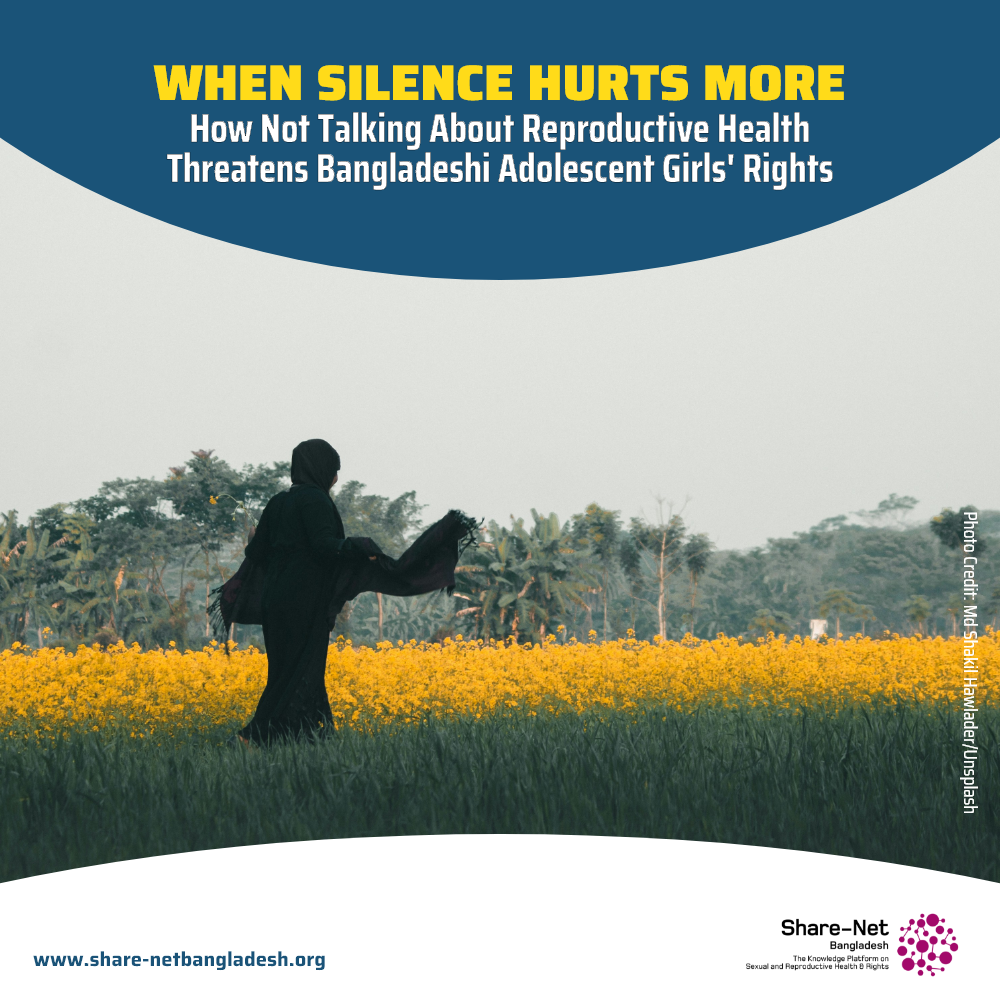When Silence Hurts More: How Not Talking About Reproductive Health Threatens Bangladeshi Adolescent Girls’ Rights
How many more girls will bleed in fear, get married without knowing why their body hurts, or suffer silently through treatable conditions—just because no one talked to them? What are we so afraid of saying out loud?
We Bangladeshis are quite well known for our over-cute shyness when it comes to the following concepts: birth, menstruation, menopause, abortion (the legal one, of course!), contraception, and last but not least—the horrendous Dollar-Euro-Roman 10 (well, you know the word… or just kindly figure it out). But the point is, why are we so abnormally shy around these words, and what are the potential risks of avoiding them?
When We Whisper About Our Bodies, Girls Pay the Price
Only 6% of schools in Bangladesh teach menstrual health. At BKSP—our national pride in sports training—86% of female athletes said they received no menstrual hygiene guidance. These numbers don’t shock me anymore. But they still sting.
Growing up in a small town in Bangladesh, I remember being told that “girls’ stuff” wasn’t to be talked about at the dinner table. Menstruation was spoken of in metaphors or, worse, silence. When a classmate fainted in school one day due to period pain, some teachers acted like it was a mysterious illness. None of us dared ask questions.
That silence followed us everywhere—from schools to hospitals, from homes to headlines. So when a legal notice was served to Dr. Tasnim Jara for publicly discussing menstruation and pregnancy, it felt familiar. The fact that she had to fight to speak about women’s health—based on evidence, not emotion—was frustrating, but not surprising.
The Cost of “You’ll Understand When You’re Older”
In many households, when children ask why women bleed, they’re hushed with, “You’ll understand when you’re older.” But most don’t. Only 53% of Bangladeshi girls know about menstruation before their first period. At BKSP, 38% of adolescent athletes had never heard of it before it happened to them.
This knowledge gap isn’t harmless. Girls miss school (around 41% stay home during periods), suffer infections, and internalize shame. Many risk long-term reproductive illnesses. Silence doesn’t protect them—it isolates them.
Adolescence Without a Map
Now add marriage to that silence. 51% of women aged 20–24 were married before 18. 92 in every 1,000 girls aged 15–19 become mothers. For many, that means leaving school early, giving birth before their bodies are ready, and living a life of dependency before they even find their voice.
Without proper sexuality education, girls can’t negotiate contraception, or consent. And it doesn’t help when female teachers or even doctors avoid the topic, fearing judgment or scandal. As Professor Aditi Sabur notes, the silence is institutional—and generational.
A Hidden Toll on Health and Hearts
Shahana Huda Ranjana puts it plainly: “Women silently endure infections and diseases for years.” And it’s not just physical. The mental burden of shame, confusion, and fear eats away at confidence. When men remain excluded from reproductive conversations—often thinking it’s “women’s business”—the risks multiply during pregnancy and childbirth.
But here’s what gives me hope.
Innovations—Though Uneven
Organizations like icddr,b, UNFPA, and SERAC-Bangladesh are doing incredible work. The HopeBox toolkit boosted SRHR knowledge from 4% to 59%. The Mukhurito app raised understanding among schoolchildren by 16%. Menstrual cups are being piloted. Yet these efforts remain localised—urban youth benefit, while rural and underprivileged girls are left behind.
So, Where Do We Go From Here?
Let’s start with education. Introduce Comprehensive Sexuality Education (CSE) from Class 5, train teachers to speak clearly and compassionately, and normalise menstrual and reproductive health across co-ed schools.
Let’s involve boys and men. Let’s make this conversation something that belongs in every family, not just in whispered chats between mothers and daughters.
Let’s scale the tools that work—apps, toolkits, and community sessions—and take them beyond city limits.
Because every time we whisper around these issues, we lose another chance to protect a girl’s health, dignity, or future.
Source: The Business Standard

